John Hurrell – 11 March, 2015
Another wonderful work is 'Untitled (sun, moon, plants)' with the amusing, seeming non sequitur of its title. The image consists of a towering, hairy Yeti figure plonked in its centre. Perhaps this figure is God, the creator of sun, moon, or plants, or maybe the first human? The choice of brush size for the vertical fur marks is what makes this painting. The thickness of the bristlehead makes the parallel downlines really beautiful.
Everybody knows David Shrigley can write, and even draw too (though he sometimes denies it, he clearly can: as the ten works on paper in the Two Rooms office testify) - but can he paint?
With a show like this (organised to display the results of his residency) in the large downstairs Two Rooms space, and a provocative title that appears to snort at people who might exalt craft, Shrigley seems to be asking himself this question? As if filling the running meterage around the walls with sixteen largish canvases coated in oil paint will answer it.
It is a colourful presentation of vertical rectangles he sets up, with lots of expanses smeared with paint, lots of simple shapes, where words (no more than three in a row), when they appear repeating the catalogued titles, are usually written in very small letters in the bottom righthand corner. In a horizontal rectangle.
So pondering the maths of his ‘Untitled’ titles (with their added brackets) and the sort of visual images they accompany, there is one two, one jewel, one ledges, one space, one steps, one good and one sun, moon, plants. However there are also two you like this, and two problems. There are even five its OKs - all deliberately mispunctuated in unison.
Some of the titles are ambiguously written and so you have to make decisions. You like this could be lacking a question mark, or each of the three words could be emphasised in turn - depending on how you respond to the scrawny fingerpainting or unconnected marks of the two optional canvases. Its OK on the other hand could be about a hovering green shape, an ominous dark night, vertigo, a gap on the bottom edge or a sunken blue shape - five interpretational possibilities on separate stretchers.
I find three works especially interesting. The bright yellow version of Untitled (its OK) is especially beguiling, due to the richness of its deep yellow field, and the tension of the Backgammon triangles (or conical fir trees) at the top and bottom of the stretcher with their vibrating diagonal edges.
There is even a tremulous Gustonesque quality that is admirable - connected to the way that artist paints stacks. This seems to be because even though Shrigley uses thick paint, straight out of the tube, his application has enough thin strokes to be streaky and linear, and that keeps his manual activity expressive - even here within the confines of restricted triangle shapes.
Another wonderful work is Untitled (sun, moon, plants) with the amusing, seeming non sequitur of its title. The image consists of a towering, hairy Yeti figure plonked in its centre. Perhaps this figure is God, the creator of sun, moon, or plants, or maybe the first human? The choice of brush size for the vertical fur marks is what makes this painting. The thickness of the bristlehead makes the parallel downlines really beautiful.
The way Shrigley uses language rises to the fore in Untitled (Good). Over the individual coloured shapes that make up a simple abstracted landscape and sky he has written ‘good’ in wonky black letters - eleven times - but on the last and twelfth one at the bottom we discover the accentuated ‘very good’. A brilliant punchline.
These seem to be very expensive coloured cartoons, textually clever but visually naive in art historical style - blended with adventurous scale (and merchandising savvy) possibly acquired from Shrigley’s tertiary education in Leicester and Glasgow. That seems accurate. Cartoons about having fun with paint’s tactility, colour and applied shape.
Shrigley cheerfully acknowledges he could never paint or draw in any other way. He works by reflex, creating a lot quickly and then shrewdly selecting the very best. It is how he edits that showcases his talent for verbal wit, and emphasises the best aspects of what he may have created accidentally, without conscious analysis or preplanning. He instinctively develops the formal painterly qualities he has hit upon by chance, while exploring his trademark lugubrious humour.
John Hurrell
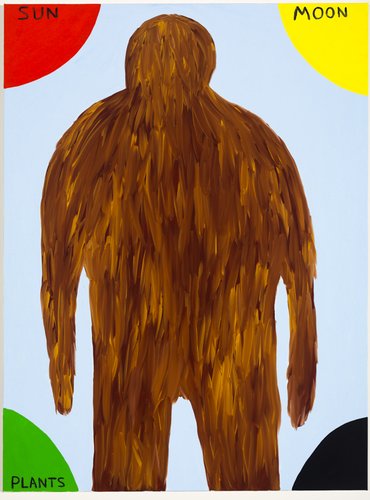



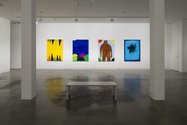
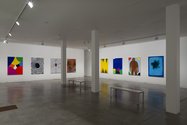


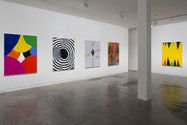
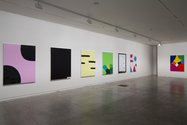


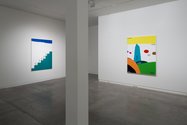
 Two Rooms presents a program of residencies and projects
Two Rooms presents a program of residencies and projects Advertising in this column
Advertising in this column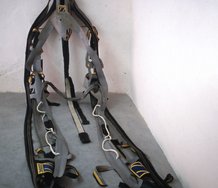
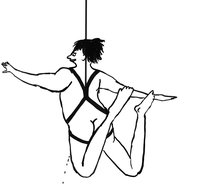
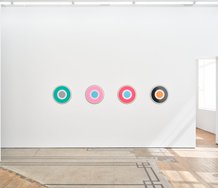
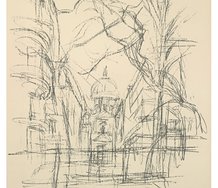
This Discussion has 0 comments.
Comment
Participate
Register to Participate.
Sign in
Sign in to an existing account.